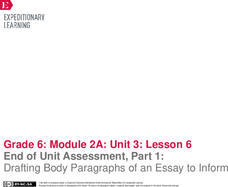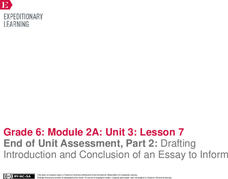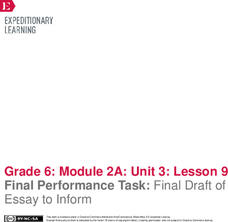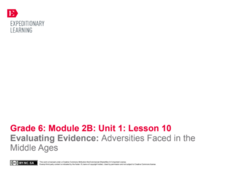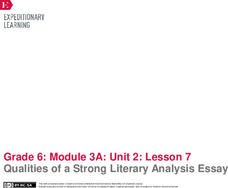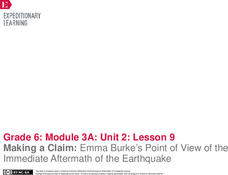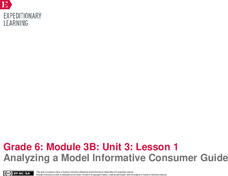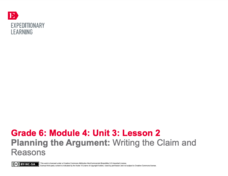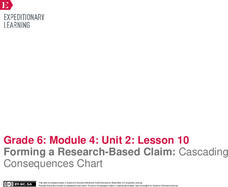EngageNY
Analyzing the Structure and Content of an Essay to Inform
Outlines are a great asset to essay planning. Scholars read and analyze a model essay about the importance of daily reading and consider how it would look in an outline format. Next, they outline their own informative essays about rules...
EngageNY
End of Unit Assessment, Part 1: Drafting Body Paragraphs of an Essay to Inform
Anybody can write a body paragraph! Pupils analyze the development of ideas in a body paragraph from a model essay. Next, using what they've learned, they draft the body paragraphs of their My Rule to Live By informative essay.
EngageNY
End of Unit Assessment, Part 2: Drafting Introduction and Conclusion of an Essay to Inform
A powerful introduction and conclusion can really pack a punch. Using the resource, scholars first read and discuss a model essay. Then, as part of the end of unit assessment, they draft the introductory and concluding paragraphs of...
EngageNY
Final Performance Task: Final Draft of Essay to Inform
Sometimes, it's fun to follow the rules. Using their drafts of an evidence-based essay from previous lessons, scholars write their final informative essays about rules to live by. Next, they choose and share quotes from their essays that...
EngageNY
Writing to Inform: Analyzing a Model Using a Rubric
Learn to write right. Scholars analyze the model essay Adversity Faced by Townspeople in the Middle Ages. They discuss the essay and make annotations working with an elbow partner. Learners then take another look at the essay using a...
EngageNY
Evaluating Evidence: Adversities Faced in the Middle Ages
How is that relevant? Scholars gain an understanding of the words relevant and compelling. They then go back to the End of Unit 1 Assessment Prompt: Adversity in the Middle Ages and look at the second bullet that pertains to relevant and...
EngageNY
Drafting Body Paragraphs
That's just the style. Learners begin with a mini-lesson about formal writing style. They then use what they learned about formal writing to begin the body paragraphs for their End of Unit 1 Assessment Prompt: Adversity in the Middle...
EngageNY
Drafting Introduction and Conclusion
In conclusion ... Scholars analyze the model essay Adversity Faced by Townspeople in
the Middle Ages to gain a better understanding of introductory and concluding paragraphs. After studying the author's strategies, learners begin writing...
EngageNY
End of Unit Assessment: Final Essay
This is just the transition phase. Scholars participate in a mini lesson about using transitions in writing. They then have a brief peer critique of the introduction and conclusion paragraphs for their end of unit assessment. Learners...
EngageNY
Performance Task Preparation: Peer Critique and Mini-Lesson Addressing Common Errors: Revising Draft Essay to Inform
Time to revise! Using a writing evaluation rubric, scholars participate in a peer editing process to provide feedback on each others' informative essays. Next, pupils begin revising their drafts based on the feedback they receive.
EngageNY
Qualities of a Strong Literary Analysis Essay
Read like a writer. Scholars read a model literary analysis in preparation for a similar writing assignment before annotating each paragraph for the gist. Next, pupils devise a list of qualities of a strong literary analysis essay.
EngageNY
Making a Claim: Emma Burke’s Point of View of the Immediate Aftermath of the Earthquake
Sharpen those pencils; it's time to write! Scholars begin writing the first body paragraph of their literary analysis essays. Additionally, pupils use graphic organizers to analyze a character's point of view from Laurence Yep's...
EngageNY
Making a Claim: Moon Shadow’s Point of View of the Immediate Aftermath
Body paragraphs are the building blocks of every essay. Pupils view and discuss a model essay using a rubric to evaluate one of its supporting paragraphs. Next, scholars use what they've learned to continue drafting their own literary...
EngageNY
Analyzing a Model Informative Consumer Guide
What do consumers need to know about overfishing before buying fish? Scholars consider the question as they prepare for their performance task, which is to create a consumer guide for people about purchasing fish responsibly. After...
EngageNY
Planning the Argument: Writing the Claim and Reasons
Step up! Using the resource, scholars discover the six steps to writing an effective position paper. Next, they work on a graphic organizer to begin planning their argument-based essays.
EngageNY
Forming a Research-Based Claim: Cascading Consequences Chart
Can you put that in writing? Scholars work with a partner to write a practice claim before writing their own claims. After writing their claims, learners share with class using a Concentric Circles activity.
EngageNY
Forming a Research-Based Claim: Creating Stakeholders Charts
Present the facts. Scholars create presentations of their research on DDT using their Cascading Consequences chart and a
Stakeholders Impacts chart as visuals. They discuss the term stakeholders and create a Stakeholders Impacts chart...
EngageNY
Forming a Research-Based Claim: Cascading Consequences Chart
Is it relevant? Scholars choose a resource from their folders and search for relevant information about the harmful and beneficial consequences of DDT. They mark benefits in one color and harmful effects with another color. They then add...
EngageNY
Using Multiple Resources of Information: Creating a Cascading Consequences Chart about DDT and Practicing a Fishbowl Discussion
For every action there is a consequence. Scholars continue their work on creating a cascading consequence chart about DDT using Welcome Back, The Exterminator, Rachel Carson: Sounding the Alarm on Pollution along with graphic organizers...
Curated OER
Supreme Court Confirmation Process
Students examine the Supreme Court and the confirmation process. They simulate a confirmation hearing with students role-playing as nominees and others as members of the Judiciary Committee. Students compose short essays outlining the...
Curated OER
Wave Terms and Concepts
In this waves worksheet, students define 23 vocabulary words associated with the different types of waves and how waves are measured. Students complete 23 matching terms with definitions and draw the superposition of two waves shown.
Curated OER
Learning Light's Properties
Students examine the properties of light and the behavior of light during interference. In this electromagnetics lesson students explain behaviors of light.
Deliberating in a Democracy
Violent Video Games
High schoolers examine violence in video games. In this American history instructional activity, learners read an article on the link between video games and violence. High schoolers respond to discussion questions and debate the topic.
Curated OER
Grammar Worksheets: Who or Whom?
Who or whom? Do your young grammarians need extra practice using interrogative pronouns correctly? The seven sentences in this exercise will provide that opportunity; however, the activity does not provide definitions, examples, or an...



